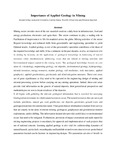Importance of Applied Geology in Mining

View/
Date
2018-04Author
Rop, Bernard K
Mwendwa, Jackson M
Maina, Caroline
Namwiba, Wycliffe H
Kiprotich, Philemon
Metadata
Show full item recordAbstract
Mining sector provides most of the raw materials used on a daily basis in infrastructure, food and energy production, electronics and agriculture. The sector continues to play a leading role in Facilitation of improvement to life for mankind across the globe. Mining activities of the sector Require knowledge and technical skills from geoscientific and engineering specialties to yield Optimal results. Applied geology as one of the geoscientific specialties contributes a fair share of the required knowledge and skills. It has continued, in the past decades, to play an important role in mining by focusing on the application of geological knowledge in harnessing of natural resources while simultaneously addressing issues that are related to mining activities and Environmental impact caused to the mining sector. The geological knowledge focuses on core areas of; volcanology, engineering geology, ore deposits, environmental geology, hydrogeology, mineral resources, energy resources, marine geology, soil mechanics, rock mechanics, applied geophysics, applied geochemistry, geo-hazards and allied mitigation measures. These core areas are of great significance as they need to be captured in the engineering design of mining and mineral processing systems before carrying out any mining operations. Indeed, these core areas provide vital information on the genesis of natural deposits, their geotechnical perspectives and methodologies on how to locate residence of the deposits. It all begins with gathering the relevant geological information that is essential for surveying Geological environments in which natural resources occur. The natural resources that are surveyed include; petroleum, natural gas, coal, geothermal, ore deposits, gemstones, ground water and geological materials for construction needs. Vital geotechnical information is learned from surveys that are usually in the areas of remote sensing, geological, geophysical and geochemical mineral explorations, and/or drilling. The information learned also provides useful leads to environmental issues that need to be mitigated. Furthermore, provision of impact assessment and audit report for mining engineering projects is mandatory for approval and implementation of such projects that are of national concern. Learning applied geology is also vital for understanding dynamics of natural hazards, particularly on earthquake and landslide related events since relevant geotechnical parameters learned can be factored in engineering designs. The parameters are also of benefit to construction needs for projects that are related to mining engineering. Furthermore, understanding past geological processes, including geohazards, climatic and hydrogeological processes enhances capabilities of designing 90% of remedies for environmental problems that occur in mining and construction industries. Applied geology provides appropriate technologies for making relevant objective decisions that are practical. The decisions made can then be reviewed and evaluated as projects progress thereby enhancing optimal economic performance. Thus, applied geology will develop a firm foundation for understanding fundamental concepts and solving pertinent problems that are related to mining engineering for self-reliance and to the satisfaction of stakeholders in the mining, geological and infrastructural industries. This paper aims at evaluating the importance of applied geology in mining activities because success of future mineral exploration and mining investments will highly depend on the input realized from its core areas if applied appropriately while protecting the environment forthwith.
